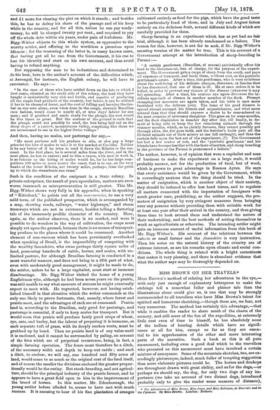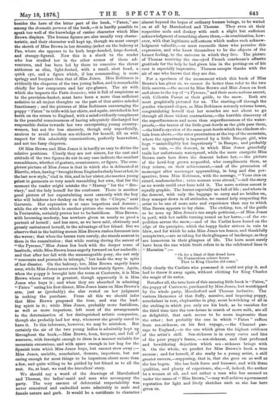MISS BROWN ON HER TRAVELS.*
Miss BROWN'S method of relating her adventures to the eye,— with only just enough of explanatory letterpress to make the etchings tell a somewhat fuller and plainer tale than the illustrations alone could give us, is one that may be strongly recommended to all travellers who have MRS Brown's talent for spirited and humorous sketching,—though these are, we fear, not very numerous. The method has certainly this advantage,—that while it enables the reader to share much of the charm of the scenery, and still more of the fun of the expedition, at extremely little cost even of time to himself, he has absolutely none of the tedium of hearing details which have no signifi- cance at all for him, except so far as they are essen- tial to his apprehension of the other and more interesting parts of the narrative. Such a book as this is all pure amusement, including even a good deal which to the travellers who procured us this amusement must have involved a certain mixture of annoyance. Some of the mountain sketches, too, are ex- ceedingly picturesque, indeed, much fuller of tempting suggestion than more elaborate pictures could be. The horses and donkeys are throughout drawn with great ability, and as for the dogs,—or perhaps we should say, the dog, for only two dogs of any im- portance (we take no account of two distant dogs, introduced probably only to give the reader some measure of distance), * The Adventures of Miss Brown, Miss Jones, and Rios Robinson, Ill Biarrats and Os the Pyrenees. By hilB8 Brown. London : Bickers. besides the hero of the latter part of the book, "Paton," are -among the dramatis persons of the book,—it is hardly possible to speak too well of the knowledge of canine character which Miss Brown displays. The human figures are also usually very charac- teristic, and their character well kept up, though we must except the sketch of Miss Brown in her dressing-jacket on the balcony at Pan, where she appears to be both large-headed, large-footed, and stumpy-figured. Now this is a shock to the reader who has studied her in the other scenes of these ad- ventures, and has been led by them to conceive the clever authoress as slim, light-footed, with a small, alert head, a quick eye, and a figure which, if less commanding, is more springy and buoyant than that of Miss Jones. Miss Robinson is evidently the chaperon of the two young ladies, and is remarkable chiefly for her composure and her eye-glasses. The air with which she inspects the Paris douanier, who is full of suspicions as to the provision-basket, must have been a more than sufficient sedative to all unjust thoughts on the part of that active-minded 'functionary; and the pictures of Miss Robinson encouraging the puppy " Patou " to trifle with her skirts, and again, stretched in her berth on the return to England, with a mind evidently complacent in the peaceful consciousness of having adequately discharged her responsible duties towards her two enterprising young country- -women, but not the less sincerely, though only superficially, anxious to avoid needless sea-sickness for herself, fill us with respect for this admirably conscientious, perfectly benevolent, and not too fussy chaperon.
Of Miss Brown and Miss Jones it is hardly so easy to divine the relative positions. Clearly they are not sisters, for the cast and attitude of the two figures do not in any case indicate the smallest resemblance, whether of gesture, countenance, or figure. The com- pletest picture of Miss Jones is that in which she is delineated at Biarritz, when, having " brought from England a shady beaver hat, in the last new style," clad in this, and in her ulster, she meets a young priest in garments so very much resembling her own, that for the moment the reader might mistake the " Murray " for the "Bre- viary," and the lady herself for the confessor. There is another good picture of her expostulating most earnestly with the boy who will belabour her donkey on the way to the "Cirque," near Gavarnie. Her expression is at once imperious and demure ; while the air with which in another picture she resents the smells in Fontarabia, certainly proves her to be fastidious. Miss Brown, with becoming modesty, has nowhere given us nearly so good a portrait of herself ; and has once, as we have said, obviously and grossly caricatured herself, to the advantage of her friend. But we observe that in the bathing scenes Miss Brown rushes foremost into the waves that when the horses turn unruly, she stands nearest to them in the consultation ; that while resting during the ascent of "the Pyrenee," Miss Jones lies back with the deeper sense of lassitude, while Miss Brown leans eagerly forward on her umbrella ; and that after her fall with the unmanageable pony, she not only "remounts and proceeds in triumph," but leads the way in spite of her disaster. On the balcony, too, Miss Brown eagerly leans over, while Miss Jones never even bends her stately figure. Again, when the puppy is brought into the room at Cauterets, it is Miss Brown whose extasy is greatest, though apparently it is Miss Jones who buys it ; and when they are absorbed in admiring
Patou " eating his first dinner, Miss Jones leans on Miss Brown's arm, just as (probably) she also rested on her judgment in making the purchase. From all this we should infer that Miss Brown proposed the tour, and was the lead- ing spirit in it ; while Miss Jones, probably more fastidious, as well as more imperious, left most of the arrangements to the determination of her distinguished artistic companion, though she probably had her way, whenever she greatly cared to have it. In this inference, however, we may be mistaken. But certainly the air of the two young ladies is admirably kept up throughout the book,—Miss Brown, keen, buoyant, and full of sesource, with foresight enough to dress in a manner suitable for mountain excursions, and with space enough in her bag for the Spanish horn which Miss Jones buys, but cannot stow away ;- Miss Jones, amiable, nonchalant, demure, imperious, but not caring enough for most things to be imperious about more than a few, and quite willing to be guided by her friend as to all the rest. So, at least, we read the travellers' story.
We should say a word of the drawings of Macclesford and Thomas, the ladies'-maid and man who accompany the party. The very essence of deferential respectability was never conceived and embodied more admirably in male and female nature and garb. It would be a certificate to character
almost beyond the hopes of ordinary human beings, to be waited on at all by Macclesford and Thomas. They even sit their respective mule and donkey with such a slight but sufficient acknowledgment of something above them,—in combination, how- ever, with that legitimate self-esteem which makes such acknow- ledgment valuable,—as must reconcile those who perceive this expression, and who know themselves to be the objects of the former feeling, to the universe in which they live. The picture of Thomas receiving the one-eyed French coachman's effusive gratitude for the help he had given him in the putting-on of his coat is especially impressive. Thomas accepts thanks with the air of one who knows that they are due.
For a specimen of the amusement which this book of Miss Brown's has given us, we cannot do better than refer to the two little ascents,—the ascent by Miss Brown and Miss Jones on foot and alone to the top of "a Pyreuee," and their more serious ascent, with Westin Passat as their guide, to the snow. Both are most graphically pictured for us. The starting-off through the gentler vineyard-slopes, as Miss Robinson serenely returns home, congratulating herself that her muscles are not about to go through all those violent contractions,—the horrible discovery of the superfluousness and more than superfluousness of the water- proofs,—the taunts of the little goat-herds as the girls pass them, —the bird's-eye view of the same goat-herds which the climbers ob- tain from above,—the utter prostration at the top of the mountain, where the opportunity is improved by a little Basque girl, who begs "unintelligibly but imperiously" in Basque, and probably not in vain, — the descent, in which Miss Jones gracefully trails her unfortunate waterproof, while the more energetic Miss Brown casts hers down the descent before her, — the picture of the herd-boy grown respectful, who compliments them, as they return, on their achievement,—and of the procession of messenger after messenger approaching, in long and dim per- spective, from Miss Robinson, with the message, " Vous etes en retard, mademoiselles ; votre maman vous attend,"—tell the story as no words could ever have told it. The more serious ascent is equally graphic. The horses especially are full of life ; and where in the descent, with only the baggage to carry and no bridles on, they scamper down in all attitudes, we cannot help suspecting the artist to be one of more note and experience than any to which Miss Brown appears to lay claim. The etching, too, of the guide as he sews up Miss Jones's too ample petticoat,—of Miss Jones in peril, with her saddle turning round on her horse,—of the ex- pedition across the snow,—and of the Carlist horn found on the edge of the precipice, which the happy finder strives in vain to blow, and for which he asks Miss Jones ten francs, and thankfully accepts two,—are as taking for their glimpses of landscape, as they are humorous in their glimpses of life. The horn must surely have been the one which Scott refers to in the celebrated lines in " Marmion "
"Oh for a blast of that dread horn On Fontarabian echoes borne That to King Charles did come."
Only clearly the Carlista who possessed it could not play it, and had to throw it away again, without eliciting for King Charles the magic of its notes.
Butafter all, the true hero of this amusing little book is "Paton," the puppy of Cauterets, purchased by Miss Jones, but worshipped by the whole party, Macclesford and Thomas inclusive. The various likenesses of that fluffy, massive, and imposing puppy, nonchalant in rest, elephantine in play, most bewitching of all in the etching in which you only see his back, as he vanishes for the third time into the cow-house in search of more milk, are all so delightful, that each seems to be more impressive than the other ; but probably the one in which " Paton " suffers from sea-sickness, on his first voyage, — the Channel pas- sage to England,—is the one which gives the highest evidence of the artist's skill. Sea-sickness is in every curve and line of the poor puppy's frame, — sea-sickness, and that profound and bewildering dejection which sea - sickness brings with it. On the whole, we predict for Miss Brown's book a true success ; and for herself, if she really be a young artist, a still greater success,—supposing, that is, that she goes on as well as she has begun. She has both force and humour, and with these qualities, and plenty of experience, she,—if, indeed, the author be a woman at all, and not rather a man who has amused us under the name of "Miss Brown,"—may well achieve a permanent reputation for light and lively sketches such as she has here given us.



































 Previous page
Previous page